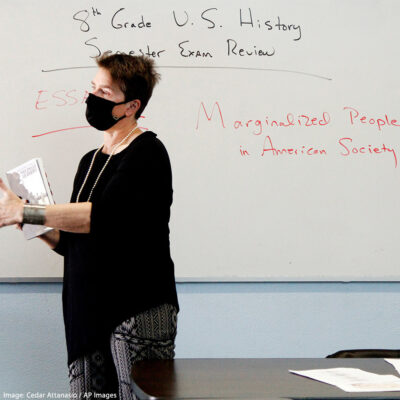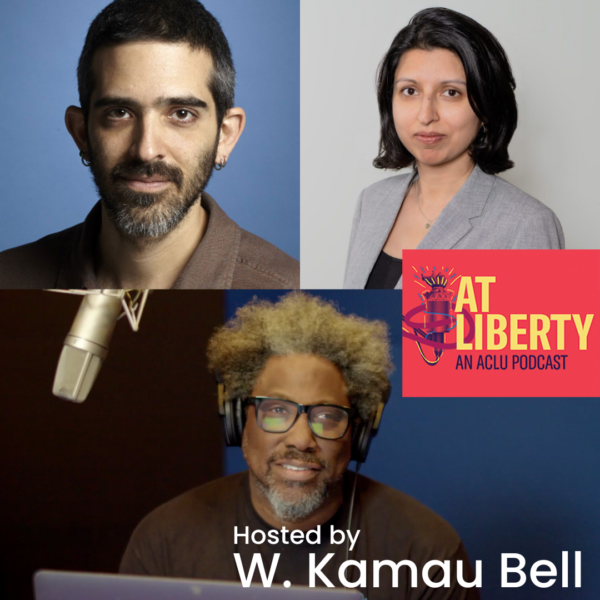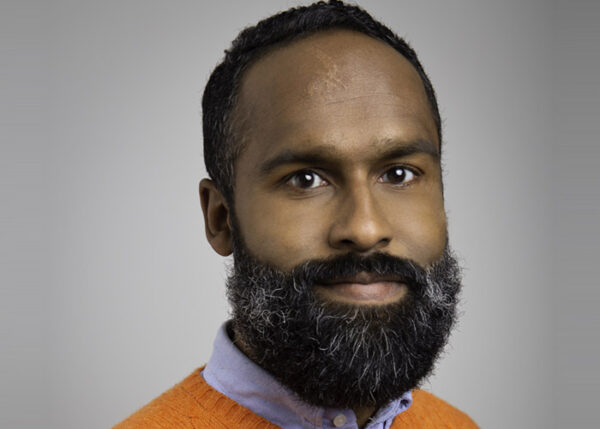
The Movement to Erase Black History and Culture
February 3, 2022
February marks Black History Month, a time to recognize the significant achievements and culture of Black Americans–from bell hooks to Beyonce–and also to honor an accurate history about them, a history that we know is rife with discrimination and abuse -- think: slavery, Jim Crow, and the structural racism we’re still infected with today. Sadly, more and more, this history is being challenged and even erased in our culture and, right now, in our schools, through tactics like curriculum restrictions and book bans. Truths we once considered hard but self-evident are now being erased before our eyes.
Over 30 state legislatures across the country have introduced bills to limit the discussion of racial history in a wave prompted by the emergence of critical race theory as a subject of political fear-mongering. But that’s just the beginning:, over 300 books by predominantly Black authors discussing race, gender, and sexuality, were also banned in the last year alone. Yes, you heard me right. We’re banning books again.
When your history is banned, how do you learn about your ancestors? How do we learn from what’s happened in the past and how it affects our present? When your culture is banned, how do you see yourself? How do you belong? How do you celebrate the stories, music, food, and family that made you?
At the ACLU, we believe that the first amendment is so fundamental because it should stop this kind of erasure in its tracks. That’s why we’re meeting this surge of censorship with new litigation and fierce advocacy.
Joining us today to share more is Emerson Sykes, a senior staff attorney with the ACLU’s Speech, Privacy, and Technology Project and longtime listeners will remember Emerson as one of At Liberty’s former hosts.
In this episode
This Episode Covers the Following Issues
Related Content
- Press ReleaseApr 2025

Free Speech
Appeals Court Must Reject Government’s Cruel Attempt To Keep Rümeysa Öztürk In Louisiana. Explore Press Release.Appeals Court Must Reject Government’s Cruel Attempt to Keep Rümeysa Öztürk in Louisiana
NEW YORK — Tonight Rümeysa Öztürk’s legal team filed their opposition to the Trump administration's emergency request to an appeals court to pause a federal judge's order requiring her transfer from an ICE detention center in Louisiana to Vermont by May 1. The government's request, known as a “motion to stay,” aims to temporarily halt the court's directive while the government appeals the ruling. It follows Judge Sessions’ denial of the government’s request that he stay Ms. Öztürk’s transfer. In practice, that temporary pause could last many months. Ms. Öztürk’s attorneys are arguing that the appellate court lacks jurisdiction at this stage and that the criteria for granting a stay are not met. They assert that the district court's proceedings should continue and that the Second Circuit Court of Appeals should deny the government’s attempt to halt Ms. Öztürk's transfer to Vermont. The government requested a ruling on the stay motion by April 29. “The Second Circuit should deny the Trump administration’s desperate attempt to avoid having to justify their unconstitutional retaliation against Rümeysa in the district court,” said Brett Max Kaufman, senior counsel with the ACLU’s Center for Democracy. “What is happening here is beyond shocking. If a young woman in another country was locked up for over a month because of an op-ed she co-wrote in a student newspaper, Americans would shudder at the thought. It's sickening that our own government not only did this but is tirelessly seeking to defer any judicial review of its misconduct while our client sits in a detention center in Louisiana, far from anything she's ever known, for who knows how long.” Ms. Öztürk, a child development researcher and Tufts University Ph.D. student here on a valid student visa, was arrested on March 25 by plainclothes ICE agents in Somerville, Massachusetts, in retaliation for co-authoring an op-ed in the Tufts student newspaper. After the arrest, the government transported her through multiple states, then flew her thousands of miles away to Louisiana, where she’s been detained ever since. In an April 24 decision, the district court noted “the government has not made a strong showing that it is likely to succeed on the merits of its jurisdictional arguments” and “any unnecessary delay of Ms. Öztürk’s transfer to this District would likely disrupt or delay the Court’s proceedings, potentially prolonging the very detention that is at the heart of this case.” The court also explained that “Ms. Öztürk’s return to Vermont would not unduly burden the government” and her continued detention in Louisiana “would not be in the public interest.” The district court noted that “the remedy here is simple, a return to the status quo” and concluded that her return to Vermont “would restore the status quo.” Members of Congress, including Massachusetts Reps. Ayanna Pressley and Jim McGovern, and Sen. Ed Markey, traveled to Louisiana this week to meet with her and advocate for her immediate release. This visit came after her legal team revealed that she has suffered a series of asthma attacks while in Department of Homeland Security (DHS) custody and has not been receiving adequate medical care. In her declaration, Ms. Öztürk said that her holding cell was crowded beyond capacity and the unsanitary, damp conditions was triggering her asthma. “The conditions in the facility are very unsanitary, unsafe, and inhumane,” she said. “There is a mouse in our cell. The boxes they provide for our clothing are very dirty and they don’t give us adequate hygiene supplies.” Ms. Öztürk is represented by the American Civil Liberties Union, ACLU of Massachusetts, ACLU of Vermont, CLEAR, Emery Celli Abady Brinckerhoff Ward & Maazel LLP, and Mahsa Khanbabai of Khanbabai Immigration Law. The following are additional quotes from Ms. Öztürk’s legal team: Sonya Levitova, Associate, Emery Celli Brinckerhoff Abady Ward & Maazel LLP: “The government has imprisoned Rümeysa for over a month for saying what she thinks. Now it’s trying to evade judicial scrutiny of its violations of her constitutional rights by running to the Second Circuit. Enough of this. Rümeysa must be returned to Vermont and freed.” Jessie Rossman, legal director, ACLU of Massachusetts: “Try as it might, the government cannot hide the simple truth at the heart of this case—there is no legitimate basis for Rümeysa's imprisonment, and the government has absolutely violated her constitutional rights. Every moment she spends behind bars is a moment too long. Her transfer to Vermont will bring her one step closer to her freedom, and we will not stop fighting until she wins.” Lia Ernst, legal director, ACLU of Vermont: “31 days. That’s how long Rümeysa has been wrongfully imprisoned by the United States government for writing an op-ed in a student newspaper. While the government recycles arguments already rejected by the courts and uses stall tactics to deny our client justice, Rümeysa remains behind bars for her constitutionally protected speech. We will not stop fighting for her freedom.” Mahsa Khanbabai of Khanbabai Immigration Law: “There is no doubt that Rumeysa is a political prisoner for having taken a pen to paper to stand up for the human rights of the Palestinian people. The Trump Administration has no evidence of wrongdoing so they use delay tactics and abuse our legal system in an attempt to cover up their weak arguments. We should be spending hard earned US taxpayer dollars for better healthcare and housing for the American people and not on private for-profit prisons.” Mudassar Toppa, staff attorney at CLEAR, a legal non-profit and clinic at CUNY School of Law: “The government is terrified at the prospect of Ms. Öztürk having her day before a court to challenge her blatantly unconstitutional abduction in broad daylight in retaliation for her speech defending Palestinian human rights. Try as they might to delay and evade accountability, we will not rest until Ms. Öztürk’s claims against the government are vindicated and she is able to return to her community.” For documents and other case information, see here.Court Case: Öztürk v. TrumpAffiliates: Massachusetts, Vermont - Press ReleaseApr 2025

Privacy & Technology
+2 Issues
Human Rights First Joins Aclu And Nyclu In Amicus Brief To Protect First Amendment Rights And Interests Of Ngos Advocating For U.s. Sanctions. Explore Press Release.Human Rights First Joins ACLU and NYCLU in Amicus Brief to Protect First Amendment Rights and Interests of NGOs Advocating for U.S. Sanctions
Today, Human Rights First, the American Civil Liberties Union (ACLU), and the New York Civil Liberties Union (NYCLU) filed an amicus brief with the U.S. District Court for the Eastern District of New York, in support of Democracy for the Arab World Now’s (DAWN) efforts to block an individual sanctioned for violence in the Israeli occupied West Bank from accessing information about DAWN’s advocacy for sanctions against him. The brief argues that various protections, including the First Amendment and reporter’s privilege, bar the court from granting the discovery requested in this case. The brief also emphasizes how such discovery requests, if granted, would put civil society groups at serious risk of irreparable harm and chill their vital advocacy work on human rights and corruption issues. In August 2024, Isaac Levi Pilant was sanctioned by the U.S. government under the West Bank sanctions program, for attacking and forcefully expelling Palestinians from a West Bank settlement. At the time, human rights groups, media outlets, and witnesses had documented Pilant’s alleged role in violent attacks against Palestinians, and DAWN had publicly recommended that the U.S. government impose sanctions on him and others for such violence. The sanctions against Pilant were lifted in January 2025, after President Trump effectively terminated the West Bank sanctions program. Pilant then filed an application against DAWN and its executive director, Sarah Leah Whitson, pursuant to a U.S. law that provides a mechanism for foreign litigants to obtain discovery from people and entities in the United States.The application seeks a court order for information related to DAWN’s investigation of Pilant and its sanctions advocacy efforts. Pilant says he seeks the information for use in a possible future defamation case in Israel against an Israeli human rights organization. The brief explains how the U.S. government has established frameworks and processes to encourage nongovernmental organizations (NGOs) to share sensitive information that can assist it in more effectively implementing various human rights and corruption sanctions and visa restriction programs. Undermining the protections for NGOs to securely and confidentially share this information would not only impact the ability of the U.S. government to use such tools to hold human rights abusers and corrupt actors accountable, but it would also put NGOs, victims of abuse, and others in civil society in jeopardy by opening them up to retaliation and harassment from people they accuse of human rights violations. “Human rights and corruption sanctions are impactful tools of accountability because they threaten the reputations and financial interests of abusers. Forcing NGOs to share information about their sanctions advocacy would put them at grave risk of violence and retaliation from repressive governments and powerful private individuals,” said Amanda Strayer, Senior Counsel for Accountability at Human Rights First. “U.S. courts should not become a forum for sanctioned actors to harass and seek retribution against civil society groups that advocate for measures to hold them accountable.” The brief also argues that Pilant’s broad discovery request implicates information protected under the First Amendment and the reporter’s privilege, which provide grounds to reject his request under the Section 1782 statute. Supreme Court precedent requires the Court to give weight to the serious First Amendment and policy considerations before granting such a request. In this case, these considerations should result in the Court denying Pilant’s discovery request. “It is the nature of human rights reporting that it often draws the ire of accused human rights violators. But the law is clear that such individuals cannot coopt U.S. courts in an attempt to harass and endanger human rights organizations and the victims of abuses whose stories they safeguard. That’s why this is an easy case, and we hope the court has no trouble concluding that the First Amendment protects DAWN’s rights to free speech and association, and bars enforcement of the meritless request for intrusive discovery,” said Nathan Freed Wessler, Deputy Director of the ACLU Speech, Privacy, and Technology Project. “NGOs can play a critical role in providing accountability for human rights abuses, and the Constitution protects them from being forced to reveal certain confidential aspects of that work,” said Bobby Hodgson, assistant legal director at the New York Civil Liberties Union. “DAWN is being targeted by a foreign litigant implicated in serious human rights violations in an effort to weaponize our court system to silence critics. We urge the court to reject these requests and recognize that the discovery process does not create an end run around the First Amendment.”Court Case: In Re: Application of Isaac Levi Pilant, for an Order Pursuant to 28 U.S.C. § 1782 to Conduct Discovery for Use in a Foreign ProceedingAffiliate: New York - New YorkApr 2025

Free Speech
In Re: Application Of Isaac Levi Pilant, For An Order Pursuant To 28 U.s.c. § 1782 To Conduct Discovery For Use In A Foreign Proceeding. Explore Case.In Re: Application of Isaac Levi Pilant, for an Order Pursuant to 28 U.S.C. § 1782 to Conduct Discovery for Use in a Foreign Proceeding
Status: Ongoing - PodcastApr 2025

Free Speech
Privacy & Technology
Know Your Digital Privacy Rights With Esha Bhandari And Daniel Kahn Gillmor. Explore Podcast.Know Your Digital Privacy Rights with Esha Bhandari and Daniel Kahn Gillmor
By: ACLU

